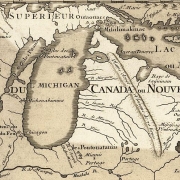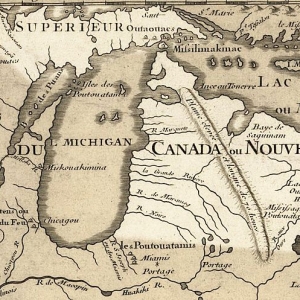Place of the Cleared Land: True Origin of the Name “Michigan”
by Dustin Bissell and Eliot A. Singer
(click here to read the essay by Dustin and Eliot)
At this time of year the fall color tours are in full swing, and one of the most popular destinations is highway M-119, the scenic, 20 mile stretch of road from Harbor Springs to Cross Village. Driving through the twisty turns of the tunnel of trees on their color tour, doubling back on the Devil’s Elbow before climbing again out of the steep valley, very few visitors pause to wonder about the people who lived in the area when the French first visited Lake Huron. Who were the early original inhabitants of this area? These were the Mashkodensh and Meskwaki, the people for whose cleared cropland the state and lake are actually named, people who had probably lived there, at least seasonally, for hundreds and hundreds of years. (For the unhappy history of the Mashkodensh, see Eliot A. Singer’s, Escotecke: Lower Michigan’s “Lost” Tribe.)
It is in this area of Emmet County, the “Land of the Crooked Tree”, that “proto-historical archeological sites” of cleared land are evident. Recently an exciting discovery has been made. Northport local historian Dustin Bissell came across an obscure glossary item at the back of J.C. Wright’s 1916 The Crooked Tree, which turns out to be the missing link in understanding the true origin of the name Michigan: Place of the Cleared Land (Mazhi’iiganing, in modern orthography).
Dustin shared his find with Eliot Singer, who consulted a few references and was quickly able to put the puzzle together, the cleared land being that in NW lower Michigan the Odaawaa attributed to the Mashkodensh, as known as Fire People. The glossary also referred to Northport as a place of cleared land, which raises the possibility for Leelanau, as well as Emmet County, as having proto-historical archeological horticultural sites.
This discovery (as you shall see) rests on the disentanglement of previously misunderstood or badly translated vocabulary words from the Odawa language. It turns out that substituting an -n- for an -m was at the root of the misunderstanding. And like most history, what gets written first often gets accepted as fact, compounding the problem. The implications for this discovery are quite profound, and we look forward to seeing how this discussion develops.





